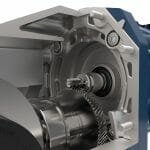A development story
Sound Leisure is a name synonymous with high quality and innovative digital and retro jukeboxes. Their team has some of the finest craftsmen and technical minds in the leisure industry. Development Engineer, Dave Darby, contacted maxon after receiving notice of the obsolescence of the AC turntable drive motor, a vital component in their jukeboxes. The business made a last time buy, and they had stock to see them through two years of production.
After looking at the existing motor and the space envelope available, Sound Leisure, together with maxon engineers, selected the maxon brushless EC 45mm flat motor. This brushless DC motor is part of a program of flat motors, ideal when space is at a premium, that gives high performance and an extensive speed range. As is usual in these instances, for speed and proof of concept, a standard motor was provided for Sound Leisure to test, before fine-tuning to include any necessary modifications. The motor was assembled into a turntable testbed. Initial testing proved positive with the standard maxon motor, but ideally, a longer shaft was needed.
The maxon engineers then created the EC 45 flat with the longer shaft. Dave and maxon Sales Engineer, Andrew Gibson, recognised an issue due to the relatively high radial load needed to drive the jukebox turntable and the short distance between the bearings. They decided to look at an alternative motor. As the EC 45 flat had been working well, it was decided to stick with the multipole motor technology and select the brushless maxon EC-i 30 mm motor. The brushless EC-i program is a series of powerhouse motors with high torque and dynamics. This motor gave the same electrical characteristics but gave a much lower ratio of distance between the bearing to the length of the shaft.
It was back to the engineers at maxon to create the modified part. Samples were built into the testbed where they were quickly on long-term test. The motor was performing faultlessly after months of continuous operation. In the meantime, Dave was fine-tuning the drive board and designing the production turntable to integrate the new motor. The first full development turntable system was built and connected to the speakers ready for integration into the jukebox casing.
The owner of Sound Leisure, Alan Black, who had worked as a sound engineer for many years, noticed with his trained ears that he could hear variations in the sound. After investigation, this was the block commutation being used to drive the motor from the motor controller, and the sound was the torque ripple of the motor poles. Andrew, together with the team at Sound Leisure, began to explore solutions. One option was using a sinusoidal commutation from a controller (maxon offers block or sinusoidal controllers) to reduce the torque ripple and make the transition from pole to pole much smoother. Electronically, this is more complicated than block commutation and would mean more development time. Another option was to revert to a brushed DC motor. The maxon DC-max 26 mm motor was selected. The DC-max motors are part of the DCX family of brushed products and can be modified online and ready for delivery within 11 working days.
Now it was time for the moment of truth, and Alan’s trained ears listened. He was delighted, the torque ripple had gone, and the sound was perfect.
Although the motor provided the required sonic performance, Alan and Dave were concerned about the wear on the motor brushes. Sound Leisure jukeboxes are designed to last a lifetime, so the most critical part of the system needed not to wear out. Andrew suggested a customised DC-max motor that incorporated precious metal brushes. Testing showed that the motor still performed flawlessly, even after many months of continuous use, and would be the perfect solution to replace the obsolete AC motor.
By working together, maxon and Sound Leisure found the perfect replacement for their high-quality jukeboxes in just 18 months.




